代词
图片预览
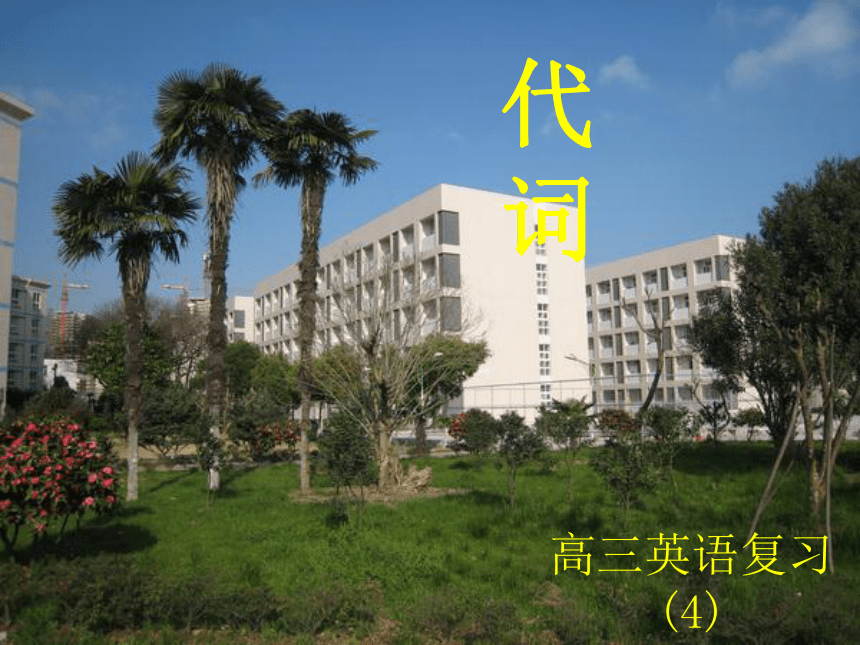
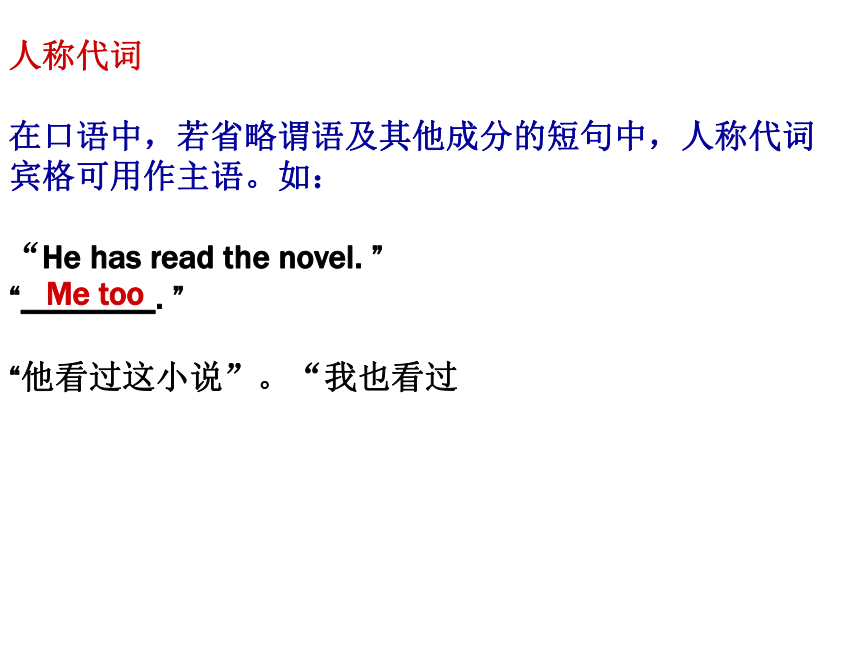
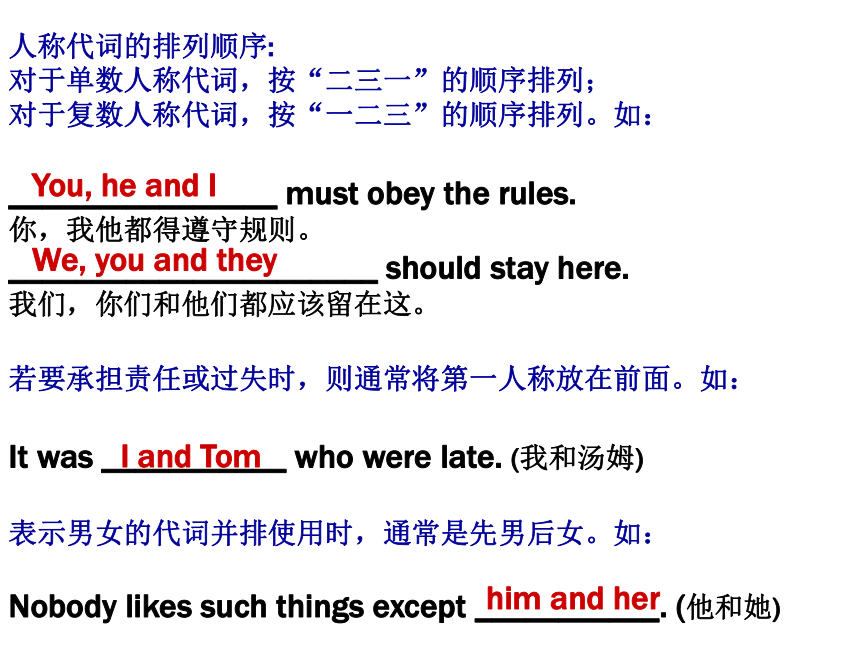
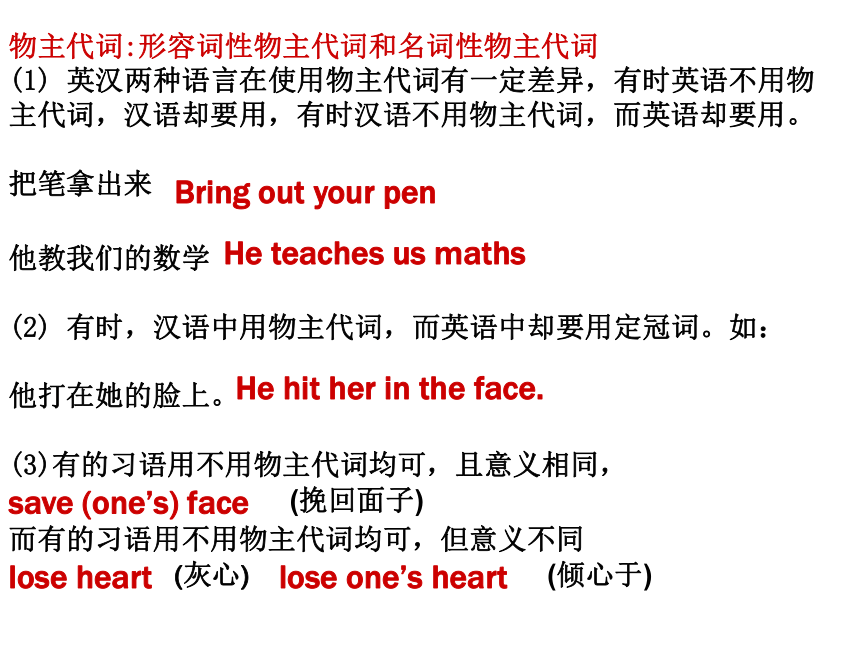
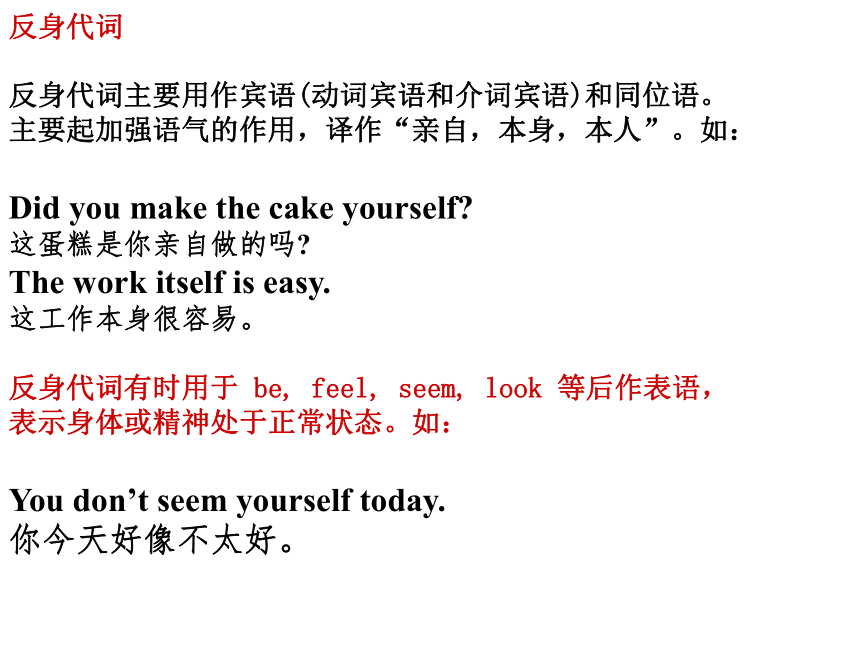
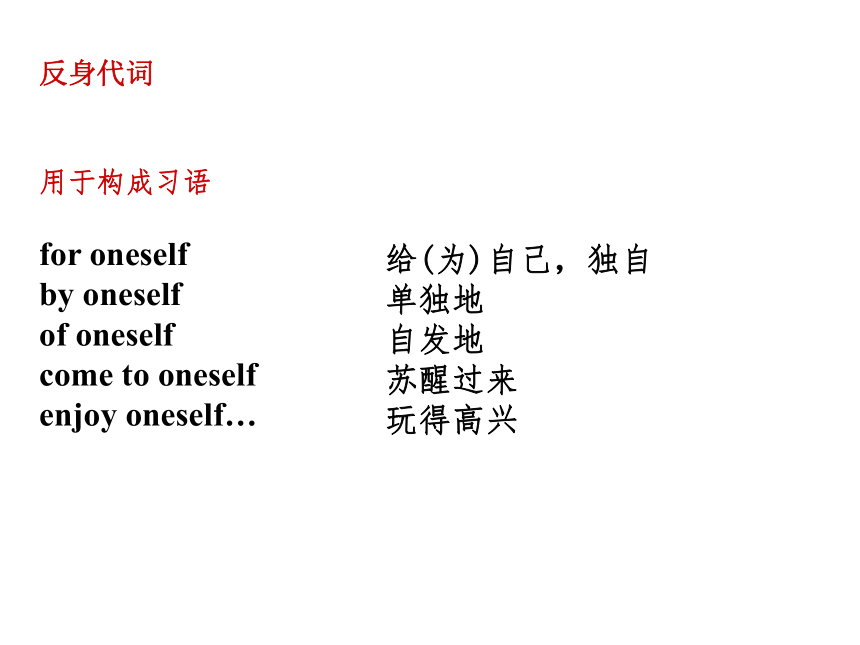
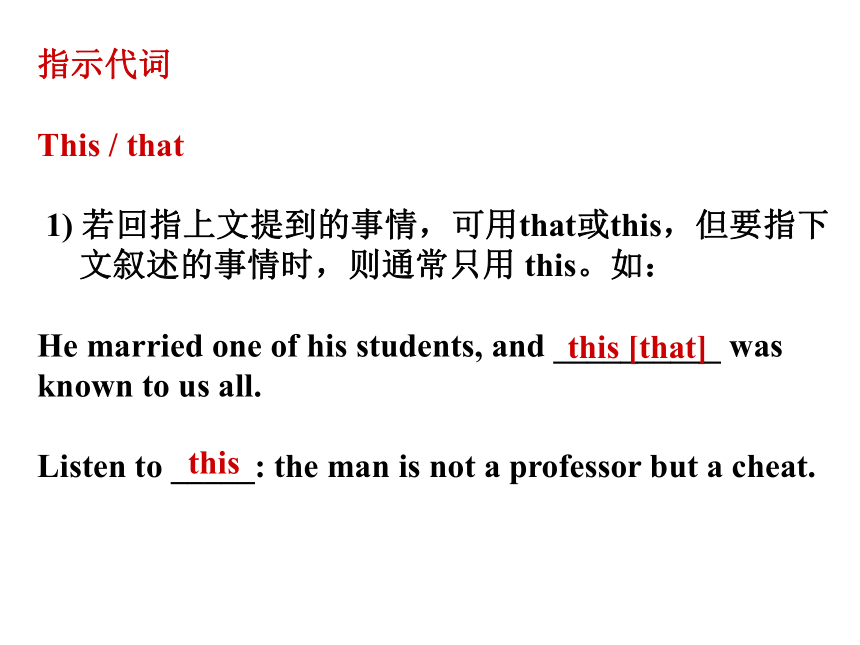
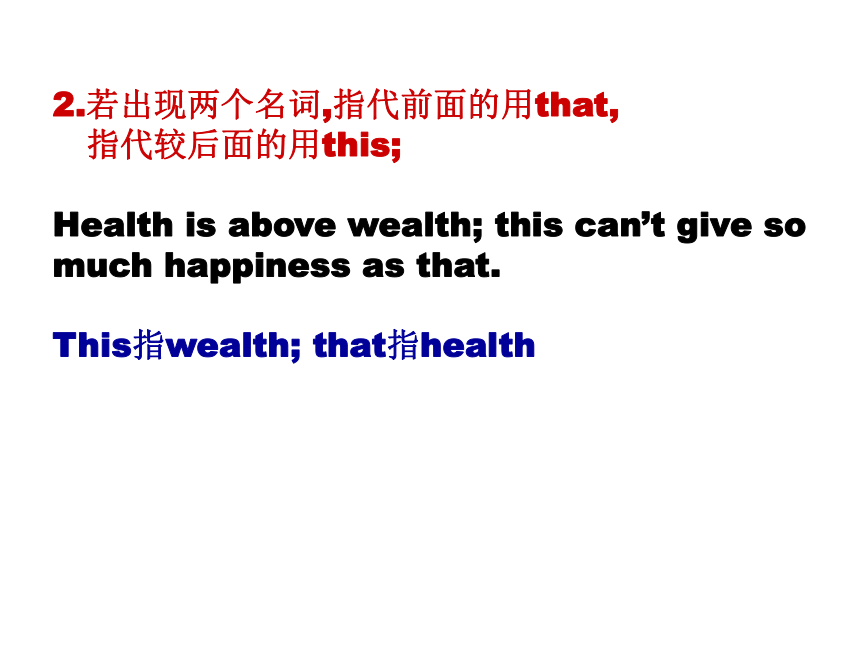
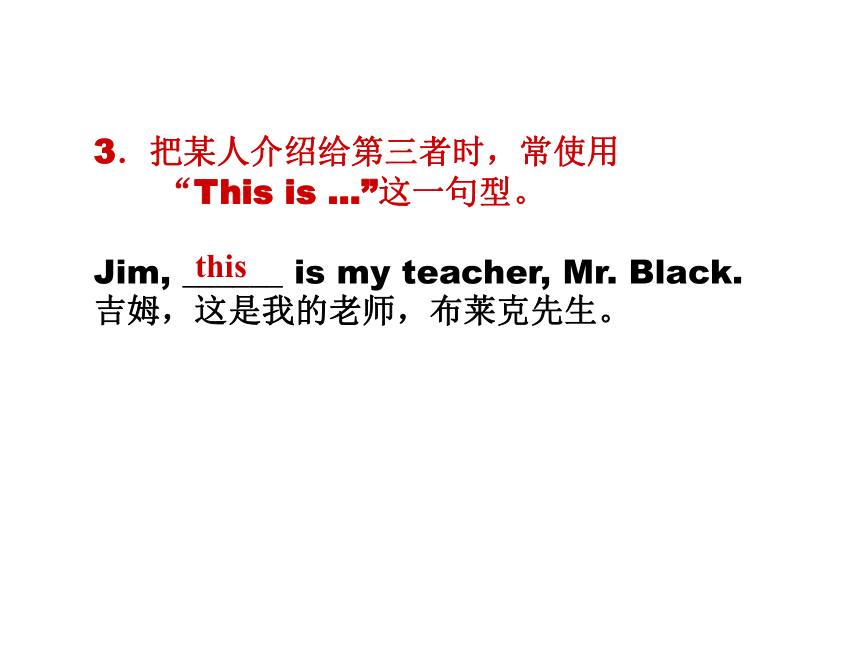
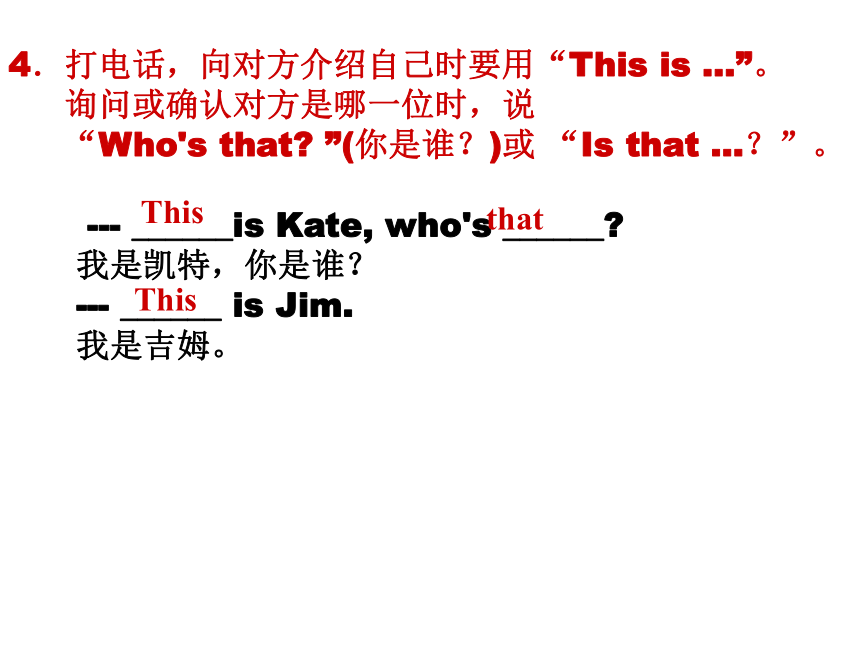
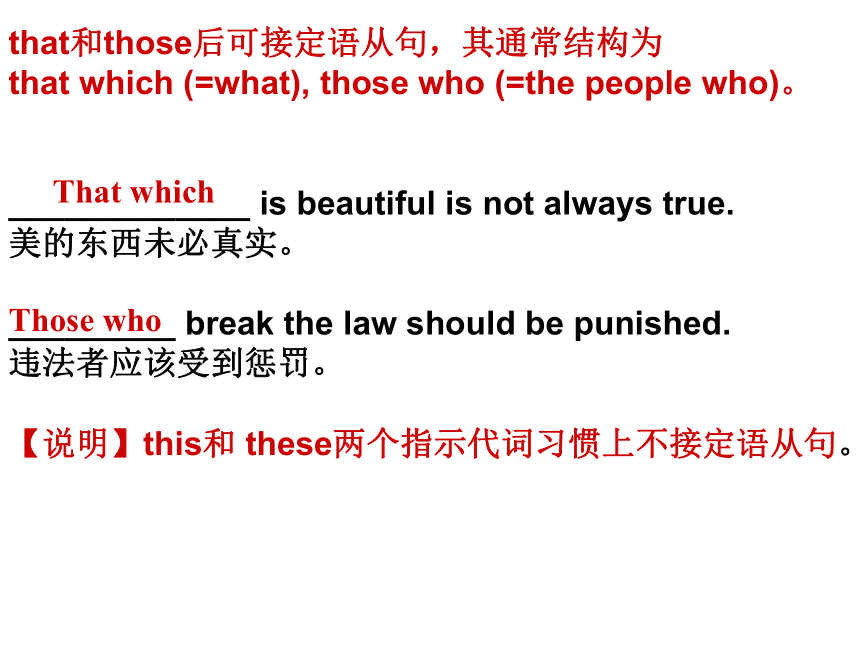
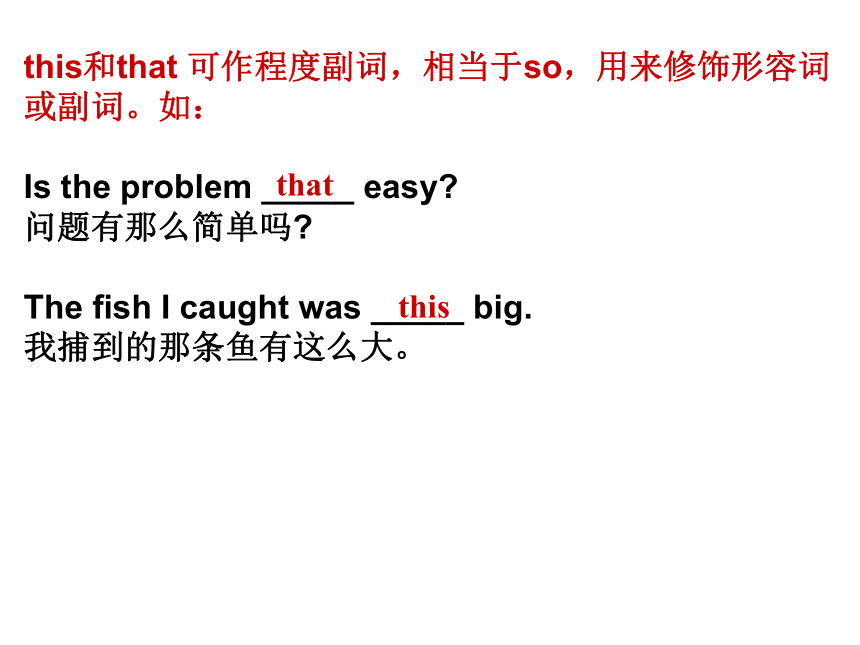
文档简介
课件39张PPT。代 词高三英语复习(4)人称代词
在口语中,若省略谓语及其他成分的短句中,人称代词
宾格可用作主语。如:
“He has read the novel. ”
“________. ”
“他看过这小说”。“我也看过
Me too人称代词的排列顺序:
对于单数人称代词,按“二三一”的顺序排列;
对于复数人称代词,按“一二三”的顺序排列。如:
________________ must obey the rules.
你,我他都得遵守规则。
______________________ should stay here.
我们,你们和他们都应该留在这。
若要承担责任或过失时,则通常将第一人称放在前面。如:
It was ___________ who were late. (我和汤姆)
表示男女的代词并排使用时,通常是先男后女。如:
Nobody likes such things except ___________. (他和她)
You, he and IWe, you and theyI and Tomhim and her物主代词:形容词性物主代词和名词性物主代词
(1) 英汉两种语言在使用物主代词有一定差异,有时英语不用物
主代词,汉语却要用,有时汉语不用物主代词,而英语却要用。
把笔拿出来
他教我们的数学
(2) 有时,汉语中用物主代词,而英语中却要用定冠词。如:
他打在她的脸上。
(3)有的习语用不用物主代词均可,且意义相同,
save (one’s) face
而有的习语用不用物主代词均可,但意义不同
lose heart lose one’s heart
Bring out your pen He teaches us mathsHe hit her in the face.(挽回面子)(灰心)(倾心于)反身代词
反身代词主要用作宾语(动词宾语和介词宾语)和同位语。
主要起加强语气的作用,译作“亲自,本身,本人”。如:
Did you make the cake yourself?
这蛋糕是你亲自做的吗?
The work itself is easy.
这工作本身很容易。
反身代词有时用于 be, feel, seem, look 等后作表语,
表示身体或精神处于正常状态。如:
You don’t seem yourself today.
你今天好像不太好。
反身代词
用于构成习语
for oneself
by oneself
of oneself
come to oneself
enjoy oneself…
给(为)自己,独自
单独地
自发地
苏醒过来
玩得高兴指示代词
This / that
1) 若回指上文提到的事情,可用that或this,但要指下
文叙述的事情时,则通常只用 this。如:
He married one of his students, and __________ was
known to us all.
Listen to _____: the man is not a professor but a cheat. this [that]this
2.若出现两个名词,指代前面的用that,
指代较后面的用this;
Health is above wealth; this can’t give so
much happiness as that.
This指wealth; that指health
3.把某人介绍给第三者时,常使用
“This is …”这一句型。
Jim, ______ is my teacher, Mr. Black.
吉姆,这是我的老师,布莱克先生。
this
4.打电话,向对方介绍自己时要用“This is …”。
询问或确认对方是哪一位时,说
“Who's that? ”(你是谁?)或 “Is that …?”。
--- ______is Kate, who's ______?
我是凯特,你是谁?
--- ______ is Jim.
我是吉姆。
ThisthatThisthat和those后可接定语从句,其通常结构为
that which (=what), those who (=the people who)。
_____________ is beautiful is not always true.
美的东西未必真实。
_________ break the law should be punished.
违法者应该受到惩罚。
【说明】this和 these两个指示代词习惯上不接定语从句。
That whichThose whothis和that 可作程度副词,相当于so,用来修饰形容词
或副词。如:
Is the problem _____ easy?
问题有那么简单吗?
The fish I caught was _____ big.
我捕到的那条鱼有这么大。
thatthis不要误解类似以下句子的意思:
We’ve arranged to meet this day week.
我们安排好一星期后见面。
this day week 意为“一周后的今天”
this day year
一年后的今天”
比较:six months ago today
“半年前的今天”,含 this和that的习语
with this
that is to say
at this
That’s all right
(in) this way
not that …but that…
now that
that is it
that will do
说完这些话
也就是说
一看到或听到
不用谢,没关系
这样
不是… 而是…
既然
对啦
够了,行了
相互代词:
each other 与 one another
no /not none/no one1.修饰可数名词单数时,no = not a
I have no friends.
= I don’t have a friend.
2. 修饰可数名词复数和不可数名词时,no = not any
There are no people in the room.
= There aren’t any people in the room.不定代词
---Who is in the reading-room?
2. --- How many students are in the classroom?
3. --- How much petrol is left?
4. --- What’s in the desk?
---No one / Nobody
--- None.
--- None.
--- Nothing.5. --- Did anyone see the film?
--- Did any one of you see the film?
6. --- Did any dog pass by here?
--- Did any one of the dogs pass by here?
---No one / Nobody (泛指)
--- None.(特指)
--- None. (泛指)
--- None. (特指)
3. no one (= nobody) 主要用来指人,不能接of 短语。
none 往往用在一定的范围内;no one 没有范围限制。
回答who引导的问句用no one或nobody;
回答how many或how much引导的问句用none。
当谈到两个人或事时,不用no 或none,而用 neither。much / many
much 修饰不可数名词,many 修饰可数名词,
Many
=_______________ +复数名词
= __________ 后接单数可数名词
A great manyMany afew/little
few修饰可数名词复数。含否定意义;a few含肯定意义
not a few
= no few = quite a few = many。
当 few受 every, last, past, next, some, very等词所
修饰时,表示肯定意义,few之前不再有冠词。
___________________ minutes, he checked up his
paper again.
He goes to see his grandma ___________ weeks.
In the last fewevery fewlittle修饰不可数名词,表示“量”。little含否定意义;
a little含肯定意义
a little=a little bit=a bit少许,少量的;
not a little
=very不少的,相当多的
Not a bit
=not at all 一点也不
what little=仅有的一点;
Home improvement has taken what little of my spare time.Have you _______ bananas?
Yes. I have _______. (No, I haven’t _______)
Would you like to give me _______, if you have
______?
Yes, I’d love to. You can come to get them
______ day you like.
I probably read about it in ______ book.
_______ 400 people attended the meeting.anysomeanyanysomeanysomeSomeSome / any及其合成词:Some / any及其合成词:Some : 1. 用于 肯定句,“一些”,修饰可数与不可数名词
2. 用于“建议,请求,反问”的问句中
3. 修饰可数名词单数,表示
“某一”,=a certain
4. 与数词连用,表示
“大约”=about
Any: 1.用于疑问句,否定句,条件句
2. 用于肯定句,表示“任何”“随便哪一。。。。”复合不定代词
受定语修饰时,定语应置于其后。如:
Tell us something interesting.
给我们讲点有趣的事。
There was nobody tired.
没有一个人很累
复合不定代词
注意以下习语
anything but
nothing but
Nothing/no more than
More than
something like
something of
something or other
决不
只有,仅仅
仅仅
不仅仅
大约,有几分像
算得上,有几分像
某事物
each /every/either/all/both/none/neither---Which of those two ties will you take?
--- I’ll take ______, to give me a change
sometimes.
Several people were very tired, but ______
of them would stop for a break.
---Which of the films do you like better?
---_________, because they are meaningless.
---Would you like tea or coffee?
---_________. I really don’t mind.
bothnoneNeitherEither---Shall I talk to him in English, French or
Spanish?
---____________ will do.
_____ of the 3 boys was glad to get a pencil
and some paper.
I’ll come to see you _______ other day.
---Which of the two ties would you like?
--- I don’t like __________ of them.= I am
interested in ________ one.
AnyEacheveryeitherneitherThere are roses on ________side of the door.
(= _______ sides) eitherbothEvery, both, all 和not连用,表示部分否定: Not every student can do this kind of work.
= Every student cannot do this kind of work.全部否定: No student can do this kind of work.
None of the students can…我们两个并非都是教师。 Not both of us are teachers.
Both of us are not teachers. 全部否定: Neither of us are teachers.
Not all of us are teachers.
All of us are not teachers. 全部否定: None of us are teachers.both, all , each 作同位语时的位置:
1) 在动词之前。
2) 在be动词、情态动词,助动词之后。
3) 多个助动词时,放在第一个助动词后。
4)省略回答中在助动词之前
5)感叹句中在系动词前---They are all students, aren’t they?
--- Yes, they all are.
They all went there.
They have all gone there.
How clever you all are! everyone / every one /anyone/any one: 1.everyone / anyone 只能指人(每人;人人) 不能与of连用
2.every one / any one 既可指人,又可指物(一般用来指物),
能与of连用
_________________________ has strong points and
weak ones.
_______________ of us has …
__________________ could answer the question.
____________ of them could… Everyone / Every oneEvery oneNo one / NoneNoneI can’t find my hat. I think I must buy _____ .
(不定)我找不到我的帽子了。我想我该去买一顶。
The hat you bought is bigger than ___ I bought.
________
(同类但不同一个)你买的那顶帽子比我买的大。
I can’t find my hat. I don’t know where I put __.
( 同一物)我找不到我的帽子。我不知道把它放在哪了。
“Do you have a bike?”
“Yes, I have ______. I have ______________.” onethatthe oneitonea new oneone / it/ thatA bridge built of stone is stronger than ______
built of wood.
Bridges built of stone are stronger than _____
built of wood.
The bridge built of stone is stronger than
_______________ built of wood.
The bridges built of stone are stronger than
_________________ built of wood.
The culture and customs of America are
like ___________ of Canada.oneonesthe one / thatthe ones / thosethoseone / it/ that1. One 示泛指, 所代替的是同类事物中特指的“另一个”.
it 表示特指,代替的是前面提到过的同一事物;
that 可代替前面提到过的名词,用于特指,只能代事物,不代替人
2. one前不仅可以有冠词,还可以有定语;但one的前面如果
形容词,不可用a
one的复数形式是ones,用来代替可数名词复数,
4. one不能代替不可数名词,如:milk, energy, happiness等。Another/ the other(s) /other(s)1.another用于泛指三者以上的不定数目中的“另一个”
I don’t like this one.
Can you show me another?
注①:another还可以跟few,数字开头的复数名词连用
Another two weeks has passed.
= Two more weeks has passed.
注②:another作名词时,复数形式为some others
或some more,
I don’t like these.
Can you show me any others? (= any more)
注③:another作形容词时复数形式为some other …,
或some more …,
Please let me see some other pens.
(= some more pens) 2.other表示不定数目中的“另外的或其他的
(一些人或物)”,在句中用作形容词修饰可数名词
(单数或复数)
There are other ways of doing this exercise.
▲ others在句中作代词用,= other + 复数名词
Do good to other people.
others
注①:在列举不定数的人或事物时,可用some…some,
或some…others
Some prefer the films, (and) others the
theaters.3.the other
① 作代词时,表示“两者中另一个人或物”(与one相对)
She has two sisters. ______ is a nurse and
___________ is a teacher.
② 作形容词时,表示确定数目中的“另一些人或物”
The post office is on the other side of the
street.
There are six students in the room.
Four are boys; ____________________ are girls.
________________onethe otherthe other twothe othersTo learn is ______ thing; to teach is __________.
I have two books. _____ is English, ___________
is French.
I have three books. _____ is English, ________
is French and _________ is German.
There are many books on the table ______ are
English, _____ are French and ____________ are
German.oneanotheronethe otheroneanother
the otherthe other
the third
one…, another,…the othersomesomeothers注意正确理解以下短语的意思:
every other
none other than
no other than
one after the other
one after another
some . . . or other
other than
the other day
每隔一……,
不是别的,正是……
一个接一个地,相继
某一个
不同于,除了
早几天,几天前
在口语中,若省略谓语及其他成分的短句中,人称代词
宾格可用作主语。如:
“He has read the novel. ”
“________. ”
“他看过这小说”。“我也看过
Me too人称代词的排列顺序:
对于单数人称代词,按“二三一”的顺序排列;
对于复数人称代词,按“一二三”的顺序排列。如:
________________ must obey the rules.
你,我他都得遵守规则。
______________________ should stay here.
我们,你们和他们都应该留在这。
若要承担责任或过失时,则通常将第一人称放在前面。如:
It was ___________ who were late. (我和汤姆)
表示男女的代词并排使用时,通常是先男后女。如:
Nobody likes such things except ___________. (他和她)
You, he and IWe, you and theyI and Tomhim and her物主代词:形容词性物主代词和名词性物主代词
(1) 英汉两种语言在使用物主代词有一定差异,有时英语不用物
主代词,汉语却要用,有时汉语不用物主代词,而英语却要用。
把笔拿出来
他教我们的数学
(2) 有时,汉语中用物主代词,而英语中却要用定冠词。如:
他打在她的脸上。
(3)有的习语用不用物主代词均可,且意义相同,
save (one’s) face
而有的习语用不用物主代词均可,但意义不同
lose heart lose one’s heart
Bring out your pen He teaches us mathsHe hit her in the face.(挽回面子)(灰心)(倾心于)反身代词
反身代词主要用作宾语(动词宾语和介词宾语)和同位语。
主要起加强语气的作用,译作“亲自,本身,本人”。如:
Did you make the cake yourself?
这蛋糕是你亲自做的吗?
The work itself is easy.
这工作本身很容易。
反身代词有时用于 be, feel, seem, look 等后作表语,
表示身体或精神处于正常状态。如:
You don’t seem yourself today.
你今天好像不太好。
反身代词
用于构成习语
for oneself
by oneself
of oneself
come to oneself
enjoy oneself…
给(为)自己,独自
单独地
自发地
苏醒过来
玩得高兴指示代词
This / that
1) 若回指上文提到的事情,可用that或this,但要指下
文叙述的事情时,则通常只用 this。如:
He married one of his students, and __________ was
known to us all.
Listen to _____: the man is not a professor but a cheat. this [that]this
2.若出现两个名词,指代前面的用that,
指代较后面的用this;
Health is above wealth; this can’t give so
much happiness as that.
This指wealth; that指health
3.把某人介绍给第三者时,常使用
“This is …”这一句型。
Jim, ______ is my teacher, Mr. Black.
吉姆,这是我的老师,布莱克先生。
this
4.打电话,向对方介绍自己时要用“This is …”。
询问或确认对方是哪一位时,说
“Who's that? ”(你是谁?)或 “Is that …?”。
--- ______is Kate, who's ______?
我是凯特,你是谁?
--- ______ is Jim.
我是吉姆。
ThisthatThisthat和those后可接定语从句,其通常结构为
that which (=what), those who (=the people who)。
_____________ is beautiful is not always true.
美的东西未必真实。
_________ break the law should be punished.
违法者应该受到惩罚。
【说明】this和 these两个指示代词习惯上不接定语从句。
That whichThose whothis和that 可作程度副词,相当于so,用来修饰形容词
或副词。如:
Is the problem _____ easy?
问题有那么简单吗?
The fish I caught was _____ big.
我捕到的那条鱼有这么大。
thatthis不要误解类似以下句子的意思:
We’ve arranged to meet this day week.
我们安排好一星期后见面。
this day week 意为“一周后的今天”
this day year
一年后的今天”
比较:six months ago today
“半年前的今天”,含 this和that的习语
with this
that is to say
at this
That’s all right
(in) this way
not that …but that…
now that
that is it
that will do
说完这些话
也就是说
一看到或听到
不用谢,没关系
这样
不是… 而是…
既然
对啦
够了,行了
相互代词:
each other 与 one another
no /not none/no one1.修饰可数名词单数时,no = not a
I have no friends.
= I don’t have a friend.
2. 修饰可数名词复数和不可数名词时,no = not any
There are no people in the room.
= There aren’t any people in the room.不定代词
---Who is in the reading-room?
2. --- How many students are in the classroom?
3. --- How much petrol is left?
4. --- What’s in the desk?
---No one / Nobody
--- None.
--- None.
--- Nothing.5. --- Did anyone see the film?
--- Did any one of you see the film?
6. --- Did any dog pass by here?
--- Did any one of the dogs pass by here?
---No one / Nobody (泛指)
--- None.(特指)
--- None. (泛指)
--- None. (特指)
3. no one (= nobody) 主要用来指人,不能接of 短语。
none 往往用在一定的范围内;no one 没有范围限制。
回答who引导的问句用no one或nobody;
回答how many或how much引导的问句用none。
当谈到两个人或事时,不用no 或none,而用 neither。much / many
much 修饰不可数名词,many 修饰可数名词,
Many
=_______________ +复数名词
= __________ 后接单数可数名词
A great manyMany afew/little
few修饰可数名词复数。含否定意义;a few含肯定意义
not a few
= no few = quite a few = many。
当 few受 every, last, past, next, some, very等词所
修饰时,表示肯定意义,few之前不再有冠词。
___________________ minutes, he checked up his
paper again.
He goes to see his grandma ___________ weeks.
In the last fewevery fewlittle修饰不可数名词,表示“量”。little含否定意义;
a little含肯定意义
a little=a little bit=a bit少许,少量的;
not a little
=very不少的,相当多的
Not a bit
=not at all 一点也不
what little=仅有的一点;
Home improvement has taken what little of my spare time.Have you _______ bananas?
Yes. I have _______. (No, I haven’t _______)
Would you like to give me _______, if you have
______?
Yes, I’d love to. You can come to get them
______ day you like.
I probably read about it in ______ book.
_______ 400 people attended the meeting.anysomeanyanysomeanysomeSomeSome / any及其合成词:Some / any及其合成词:Some : 1. 用于 肯定句,“一些”,修饰可数与不可数名词
2. 用于“建议,请求,反问”的问句中
3. 修饰可数名词单数,表示
“某一”,=a certain
4. 与数词连用,表示
“大约”=about
Any: 1.用于疑问句,否定句,条件句
2. 用于肯定句,表示“任何”“随便哪一。。。。”复合不定代词
受定语修饰时,定语应置于其后。如:
Tell us something interesting.
给我们讲点有趣的事。
There was nobody tired.
没有一个人很累
复合不定代词
注意以下习语
anything but
nothing but
Nothing/no more than
More than
something like
something of
something or other
决不
只有,仅仅
仅仅
不仅仅
大约,有几分像
算得上,有几分像
某事物
each /every/either/all/both/none/neither---Which of those two ties will you take?
--- I’ll take ______, to give me a change
sometimes.
Several people were very tired, but ______
of them would stop for a break.
---Which of the films do you like better?
---_________, because they are meaningless.
---Would you like tea or coffee?
---_________. I really don’t mind.
bothnoneNeitherEither---Shall I talk to him in English, French or
Spanish?
---____________ will do.
_____ of the 3 boys was glad to get a pencil
and some paper.
I’ll come to see you _______ other day.
---Which of the two ties would you like?
--- I don’t like __________ of them.= I am
interested in ________ one.
AnyEacheveryeitherneitherThere are roses on ________side of the door.
(= _______ sides) eitherbothEvery, both, all 和not连用,表示部分否定: Not every student can do this kind of work.
= Every student cannot do this kind of work.全部否定: No student can do this kind of work.
None of the students can…我们两个并非都是教师。 Not both of us are teachers.
Both of us are not teachers. 全部否定: Neither of us are teachers.
Not all of us are teachers.
All of us are not teachers. 全部否定: None of us are teachers.both, all , each 作同位语时的位置:
1) 在动词之前。
2) 在be动词、情态动词,助动词之后。
3) 多个助动词时,放在第一个助动词后。
4)省略回答中在助动词之前
5)感叹句中在系动词前---They are all students, aren’t they?
--- Yes, they all are.
They all went there.
They have all gone there.
How clever you all are! everyone / every one /anyone/any one: 1.everyone / anyone 只能指人(每人;人人) 不能与of连用
2.every one / any one 既可指人,又可指物(一般用来指物),
能与of连用
_________________________ has strong points and
weak ones.
_______________ of us has …
__________________ could answer the question.
____________ of them could… Everyone / Every oneEvery oneNo one / NoneNoneI can’t find my hat. I think I must buy _____ .
(不定)我找不到我的帽子了。我想我该去买一顶。
The hat you bought is bigger than ___ I bought.
________
(同类但不同一个)你买的那顶帽子比我买的大。
I can’t find my hat. I don’t know where I put __.
( 同一物)我找不到我的帽子。我不知道把它放在哪了。
“Do you have a bike?”
“Yes, I have ______. I have ______________.” onethatthe oneitonea new oneone / it/ thatA bridge built of stone is stronger than ______
built of wood.
Bridges built of stone are stronger than _____
built of wood.
The bridge built of stone is stronger than
_______________ built of wood.
The bridges built of stone are stronger than
_________________ built of wood.
The culture and customs of America are
like ___________ of Canada.oneonesthe one / thatthe ones / thosethoseone / it/ that1. One 示泛指, 所代替的是同类事物中特指的“另一个”.
it 表示特指,代替的是前面提到过的同一事物;
that 可代替前面提到过的名词,用于特指,只能代事物,不代替人
2. one前不仅可以有冠词,还可以有定语;但one的前面如果
形容词,不可用a
one的复数形式是ones,用来代替可数名词复数,
4. one不能代替不可数名词,如:milk, energy, happiness等。Another/ the other(s) /other(s)1.another用于泛指三者以上的不定数目中的“另一个”
I don’t like this one.
Can you show me another?
注①:another还可以跟few,数字开头的复数名词连用
Another two weeks has passed.
= Two more weeks has passed.
注②:another作名词时,复数形式为some others
或some more,
I don’t like these.
Can you show me any others? (= any more)
注③:another作形容词时复数形式为some other …,
或some more …,
Please let me see some other pens.
(= some more pens) 2.other表示不定数目中的“另外的或其他的
(一些人或物)”,在句中用作形容词修饰可数名词
(单数或复数)
There are other ways of doing this exercise.
▲ others在句中作代词用,= other + 复数名词
Do good to other people.
others
注①:在列举不定数的人或事物时,可用some…some,
或some…others
Some prefer the films, (and) others the
theaters.3.the other
① 作代词时,表示“两者中另一个人或物”(与one相对)
She has two sisters. ______ is a nurse and
___________ is a teacher.
② 作形容词时,表示确定数目中的“另一些人或物”
The post office is on the other side of the
street.
There are six students in the room.
Four are boys; ____________________ are girls.
________________onethe otherthe other twothe othersTo learn is ______ thing; to teach is __________.
I have two books. _____ is English, ___________
is French.
I have three books. _____ is English, ________
is French and _________ is German.
There are many books on the table ______ are
English, _____ are French and ____________ are
German.oneanotheronethe otheroneanother
the otherthe other
the third
one…, another,…the othersomesomeothers注意正确理解以下短语的意思:
every other
none other than
no other than
one after the other
one after another
some . . . or other
other than
the other day
每隔一……,
不是别的,正是……
一个接一个地,相继
某一个
不同于,除了
早几天,几天前
